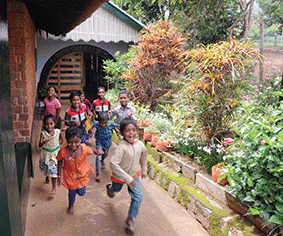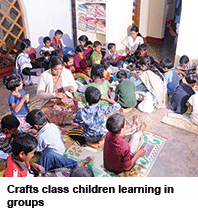Deep within the Gudalur valley, bounded by the Mudumalai, Wyanad and Bandipur tiger reserves, the Viswa Bharati Vidyodaya Trust has developed a school which is attracting the neglected children of Adivasi tribes into primary education
 “What use is your education to us? It will only take away our children. Your schools talk about changing the environment for the better, but is this not the best? We want to preserve it just as it was given to us by our ancestors. Who will be here to protect the trees, the streams, fish, the elephant and deer when we are gone?”
“What use is your education to us? It will only take away our children. Your schools talk about changing the environment for the better, but is this not the best? We want to preserve it just as it was given to us by our ancestors. Who will be here to protect the trees, the streams, fish, the elephant and deer when we are gone?”
These words spoken by a Paniya tribal leader 25 years ago prompted the promotion of the Vidyodaya School and Viswa Bharati Vidyodaya (VBV) Trust in Gudalur, Tamil Nadu. Gudalur town (pop. 40,000) is situated in the Gudalur valley, bounded by the Mudumalai, Wyanad and Bandipur tiger reserves. An estimated 20,000 Adivasi (scheduled tribe) population including the Paniya, Kurumba, Kattunaicker and Irular tribes live in 320 hamlets within a 50-km radius of the town, some of them inside the tiger reserves.
Tea and coffee have been cultivated in the Gudalur valley for the past two centuries. The plantations, however, have had an adverse effect on the Adivasi people, drawing them out of their forest habitats on to the margins of large estates. Moreover in the 1980s, a Central government declaration which transformed their natural habitats into ‘national forests’, deprived the Adivasi communities of ownership of their traditional land, food, water, medicinal herbs and even their spirits and sacred groves. “This alienation of the Adivasis resulted in the children of this community suffering discrimination and neglect within the traditional school system which wasn’t at all interested in their rich cultural heritage. The Vidyodaya School was started in 1991 to address the educational neglect and socio-economic backwardness of this community,” recalls B. Ramdas, managing trustee of VBV Trust. Currently, the Vidyodaya School has 100 K-V children mentored by eight teachers.
HISTORY
The promoters of Vidyodaya are Gudalur-born Ramdas, a former lawyer-turned-educationist, and his wife Rama Shastri, a medical technology graduate of Madras University. Disillusioned with living in increasingly crowded Chennai, the duo accepted an assignment in Pondicherry to work in a school for ostracised children of a leprosy-stricken community. After almost a decade and having acquired considerable teaching experience, Ramdas and Rama returned to their native Gudalur and began home schooling their own two children together with several tribal children on their ancestral family farm. With the home-schooled children refusing to attend the local government school, in 1993 Rama and Ramdas registered the Viswa Bharati Vidyodaya Trust which formally promoted the Vidyodaya School, an alternative education institution with its own grassroots pedagogy and development philosophy.
UNIQUE PEDAGOGY
Developing a curriculum and pedagogy to teach Adivasi children was a challenge because Ramdas and Rama’s experience had been with middle class, urban children. Each of the Adivasi tribes spoke a different language, none of them connected with Tamil which is the medium of instruction in government primaries. To address this problem, linguists from the Central Institute of Indian Languages, Mysore, were roped in to develop primers supplemented with pictorial dictionaries in the tribal languages, Tamil and English.
“Vidyodaya is an Adivasi school set on an empathetic and innovative foundation incorporating Adivasi history, culture, songs and stories in the curriculum. Children are encouraged to speak their languages and teachers, recruited from local communities, are encouraged to develop local dialects. With teachers in the pre-primary and early years being Adivasis themselves and the teacher-pupil ratio maintained at 1:10 and children taught in groups according to knowledge and learning capability rather than according to age, they learn happily. Our objective is to establish and develop a culturally appropriate learning system with active participation of the community so that every child completes not only primary schooling, but whatever level she desires,” says trustee Rama Shastri who has played a major role in developing the school’s grounded philosophy and pedagogy.
VBVT IMPACT
 In 1999, a mere 737 children’s names were listed in 20 schools in Gudalur valley’s 320 hamlets, with only half of them attending classes regularly. This included 35 children in VBVT’s primary school in Gudalur town. Since then, the number of children attending over 60 government and private schools has risen to 2,908 with an additional 520 infants attending government-run anganwadis.
In 1999, a mere 737 children’s names were listed in 20 schools in Gudalur valley’s 320 hamlets, with only half of them attending classes regularly. This included 35 children in VBVT’s primary school in Gudalur town. Since then, the number of children attending over 60 government and private schools has risen to 2,908 with an additional 520 infants attending government-run anganwadis.
Two decades after the Vidyodaya School struck root in Gudalur, Ramdas is satisfied that the VBV Trust has made a “major impact” in the district and upon the marginalised Adivasi population. “Over the years Vidyodaya School has evolved into a model primary school with the trust’s outreach programme covering the entire Adivasi population in Gudalur Block (pop. 200,000). Now, the trust tracks the education progress of almost 3,000 Adivasi children in all schools of the taluka whom we help with curriculum development and teacher training. In the process, we have developed an excellent relationship with the state government which has established a residential school in the taluka under its Sarva Shiksha Abhiyan (education for all) programme and requested the VBV Trust to manage it. Moreover, we have an apprenticeship programme under which we attach out-of-school youth to local workshops and workplaces so they learn a skill,” says Ramdas.
FUTURE PLANS
With the Vidyodaya primary school and the VBV Trust having sparked a learning revolution in the backward Gudalur taluka and within the marginalised Adivasi community, it’s set to spread its wings. It has purchased a 1.5-acre plot on the outskirts of the town, where it intends to provide secondary (class VI-X) and vocational skills education.
“We are very thankful to the Sir Ratan Tata and Navajibai Ratan Tata trusts which have funded and continue to fund, 75 percent of our annual expenditure of Rs.30 lakh with the remainder provided by friends and well-wishers, including the Asha For Education, USA and Adivasi Cooperation Organisation in Germany. Moreover, we have recently been accorded the status of a Changemaker School by the globally networked US-based Ashoka Innovators for the Public. I am confident this recognition will enable us to expand our reach to educators and donors who will help us take our mission forward,” says Ramdas.
God speed!
(The authors Priya Rollins and Rajesh Varghese are Bangalore-based senior consultants with Ashoka Innovators for the Public)























